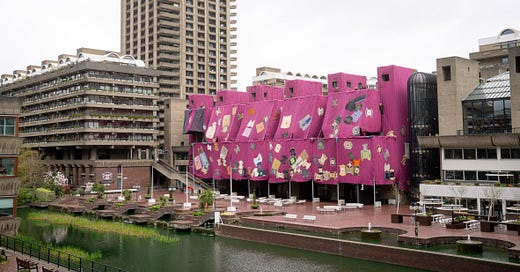🔅 From Textile Takeovers to Treasure Hunts
Magenta Makeovers, Corruption Probes, and Ethiopia's Property Ownership Revolution
Photo of the Day

Spotlight Stories
Ghana's Textile Maestro Gives London's Barbican a Magenta Makeover
Ibrahim Mahama, the Ghanaian artist who's been making waves in the art world faster than you can say "brutalist architecture," has pulled off a textile takeover of London's Barbican Centre that's as bold as it is beautiful. Brace yourselves, folks, because this isn't your grandma's crochet project.
Mahama has draped a mind-boggling 2,000 square meters of magenta fabric over the Barbican's facade, transforming the grey concrete behemoth into a billowing pavilion that's part art installation, part statement piece. And if you look closely, you might even spot a few garments that have been, ahem, "blessed" with human urine. More on that later.
The artist, who's known for enveloping buildings in tattered jute sacks that once hauled cocoa beans and other goods, decided to switch things up with a burst of bright colour. Why? Because, as Mahama puts it, "The British weather is always very grey, why not pick a colour that contrasts with the sky?" Fair point.
But there's more to this textile takeover than meets the eye. Mahama enlisted 1,000 weavers and seamstresses to produce the fabric by hand over five months, drawing a parallel to the labourers who hand-finished the Barbican's concrete surface with pick hammers back in the '70s. It's like a cross-generational high-five between craftspeople.
Now, about those urine-soaked garments:
Mahama incorporated traditional Ghanaian robes called batakaris into the fabric, but getting people to part with these cherished items wasn't easy. Some folks believe that if you take a batakari to a shaman, you can curse its owner. To counteract this, some contributors decided to pee on their robes before handing them over, believing it would desacralize the material. Talk about a unique way to leave your mark on art!
Mahama's rise in the art world has been nothing short of meteoric, and he's using his success to create an art scene from scratch in his hometown of Tamale, Ghana. He's built cultural centres, repurposed abandoned structures, and even collected hundreds of meters of colonial-era train tracks for artistic and educational use.
So, if you're in London, be sure to swing by the Barbican and take in the magenta magnificence of Mahama's textile takeover.
Nigeria's Epic Treasure Hunt: Uncovering a Minister's Maze of Bank Accounts
Nigeria has recovered an amazing 30 billion naira ($24 million) as part of an ongoing corruption probe into suspended Humanitarian Affairs and Poverty Alleviation Minister Betta Edu.
The saga began in January when Dr Edu, a sprightly 37-year-old, was suspended over the alleged diversion of $640,000 of public money into a personal bank account. Her office claimed that the transfer, which was approved by Edu herself, was for the "implementation of grants to vulnerable groups." Because apparently, the best way to help the vulnerable is to funnel money into a personal account.
President Bola Tinubu consequently ordered an investigation into Edu's ministry, probably while sipping tea and thinking, "This ought to be good." And boy, was he right.
The Economic and Financial Crimes Commission (EFCC) has been on the case for nearly six weeks now, and they've stumbled upon more angles than a geometry textbook. Chairman Ola Olukoyede said in the agency's monthly e-magazine, EFCC Alert, that they're investigating over 50 bank accounts that they've traced the millions into.
The good news is that the recovered funds are "already in the coffers of the federal government," according to Olukoyede.
The suspension of a minister is a rare occurrence in Nigeria, which makes this case all the more intriguing.
The Clock Keeping Track of Africa's Youth Employment Numbers
Africa is about to witness its largest youth population boom this decade, with numbers expected to swell by nearly 100 million from 2023 to 2030. That’s a lot of fresh faces in need of jobs, and World Data Lab (WDL) and the Mastercard Foundation have unveiled the Africa Youth Employment Clock, which is aimed at keeping track of employment rates and trends.
Job growth will be monitored up to 2030, with insights sliced by age, gender, sector, and more.
It will provide data across the continent to arm policymakers, development gurus, and basically anyone keen on boosting Africa’s labour markets with the intel they need to make informed decisions.
Thanks to a treasure trove of data from national stats bodies, the International Labour Organization (ILO), and the International Institute for Applied Systems Analysis (IIASA), the Clock will be as credible as it gets.
The Africa Youth Employment Clock is open to all at africayouthjobs.io.
Ethiopia Says "Welcome!" to Foreign Property Owners

Ethiopia is finally opening its doors to foreign property ownership. Prime Minister Abiy Ahmed, the country's very own economic liberalization cheerleader, announced the policy shift on state TV, promising to introduce a law that will allow foreigners to snap up a piece of the Ethiopian dream.
For decades, Ethiopia has banned foreign property ownership due to political and economic concerns.
But times are changing, and Abiy is determined to change Ethiopia's state-run economy. He's already invited international investors to take a slice of the telecoms and banking sectors, with varying degrees of success.
Some locals are worried that opening up the real estate market could lead to them being priced out. But others, like property developer Solomon Assefa, see the potential for the move to bring in some much-needed foreign exchange.
Food for Thought
“The night has ears."
— Maasai Proverb






